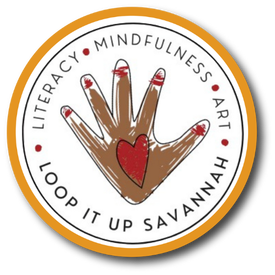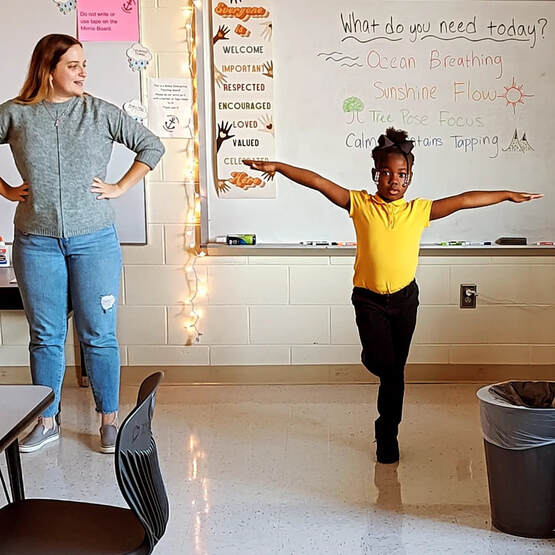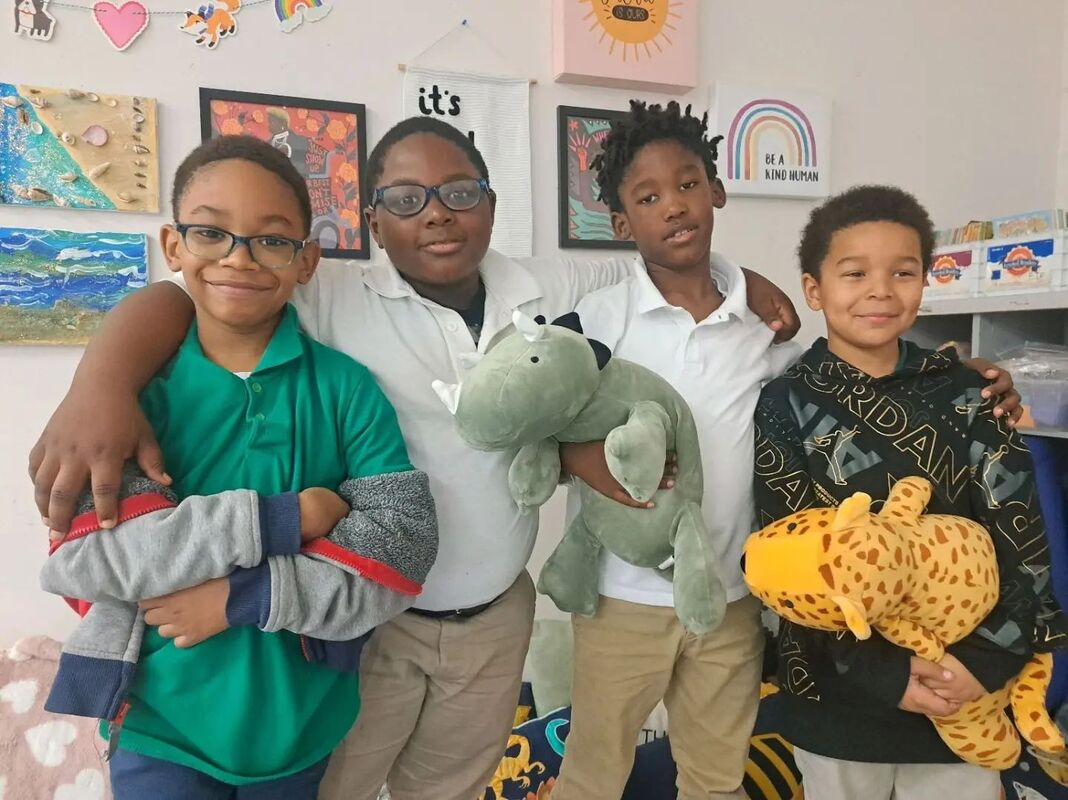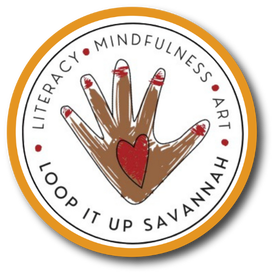Deep Dive into the Mindfulness Zone!
Program brings emotional wellness, awareness to local school and beyond
We’re not just helping our kids when we teach techniques like controlled breathing or using a focal point. There are so many things that ripple effect in a positive way. Room 1307 at Andrea B. Williams Elementary School in Savannah, Georgia, is a magical place. Oh sure, it may look like your average elementary school classroom. But once you step through the doorway, you’re transported into The Mindfulness Zone.
Inside, Ms. Gabby, a senior enrichment specialist with Loop It Up Savannah, leads a small group of third-graders through several calming and centering techniques. |
It’s not an easy task to keep these little ones focused so close to Christmas, but Ms. Gabby does it.
“How did you like that?” she asks after the Ocean Breathing exercise, a nasal breathing technique that uses controlled inhales and exhales that sound like waves crashing on an ocean shore. Three thumbs up from Malachi, Mauricio, and Syrell. One sideways thumb from Malaysia. Ms. Gabby smiles.
“Oh, just so-so?” she acknowledges. “That’s OK. Let’s find something you really like.”
Next up is Sunshine Yoga Flow, a yoga sequence that flows from mountain pose to standing forward fold; then Tree Pose Focus, which improves focus and concentration while calming the mind; and finally, Calm Mountain Tapping, which anchors the feet and uses two fingers to tap the forehead, nose, and chin.
“How did that exercise make you feel?” Ms. Gabby asks.
“Joyful,” says Malachi.
“Calm,” says Syrell.
“Peaceful,” says Malaysia.
The group discusses ways they can each use these techniques – not just inside the school, but out – and then proceeds to document their favorite exercise with an original piece of artwork. Those who finish their drawings and paintings early are free to venture over to the rug surrounded with throw pillows. Syrell leans back comfortably on a pile of pillows. Mauricio and Malachi pull a yoga mat from the basket and practice triangle pose and child’s pose. Malaysia perfects her artistic interpretation of Tree Pose. All are experiencing what the former host of The Daily Show referred to as a “moment of Zen.”
“How did you like that?” she asks after the Ocean Breathing exercise, a nasal breathing technique that uses controlled inhales and exhales that sound like waves crashing on an ocean shore. Three thumbs up from Malachi, Mauricio, and Syrell. One sideways thumb from Malaysia. Ms. Gabby smiles.
“Oh, just so-so?” she acknowledges. “That’s OK. Let’s find something you really like.”
Next up is Sunshine Yoga Flow, a yoga sequence that flows from mountain pose to standing forward fold; then Tree Pose Focus, which improves focus and concentration while calming the mind; and finally, Calm Mountain Tapping, which anchors the feet and uses two fingers to tap the forehead, nose, and chin.
“How did that exercise make you feel?” Ms. Gabby asks.
“Joyful,” says Malachi.
“Calm,” says Syrell.
“Peaceful,” says Malaysia.
The group discusses ways they can each use these techniques – not just inside the school, but out – and then proceeds to document their favorite exercise with an original piece of artwork. Those who finish their drawings and paintings early are free to venture over to the rug surrounded with throw pillows. Syrell leans back comfortably on a pile of pillows. Mauricio and Malachi pull a yoga mat from the basket and practice triangle pose and child’s pose. Malaysia perfects her artistic interpretation of Tree Pose. All are experiencing what the former host of The Daily Show referred to as a “moment of Zen.”
|
Such a scene is not a surprise to Tahisha Wright, Savannah-Chatham County’s Special Education Program Manager for Instruction and co-founder of The Mindfulness Zone. In 2018, she was the newly-appointed principal of Juliette Gordon Low Elementary School and was overseeing its challenging merger with Thunderbolt Elementary.
“We had two communities coming together – two sets of students, two sets of staff – and it was not a unified or harmonious community,” she recalls. “At the time, I was looking for strategies to implement that would change the culture and was reading articles about mindfulness in schools and its impacts. It was merely a thought.” Wright shared her “mere” thoughts with Molly Lieberman, founder and executive director of Loop It Up Savannah, who then “made the magic happen.” Juliette Low, the inaugural Mindfulness Zone program, started humbly in 2018 by designating a single room in the school for mindfulness. |
Tahisha Wright
SCCPSS Special Education Program Manager |
“Loop It Up and other community partners decorated the room and provided all of the resources and books we needed,” Wright says. “We targeted students who needed additional support with their behavior and they were able to come to the designated Mindfulness Zone room with a Loop It Up staff member to learn strategies about how they could be mindful of their thoughts and actions.”
When Wright witnessed those students’ improvement both behaviorally and academically, she began brainstorming ways she could impact more students. Together with Loop It Up, she created a mindfulness curriculum that incorporated literacy, trained teachers, and implemented schoolwide programming for half an hour every morning for each of her 640 students. The year before Wright took over the helm at Juliette Low, the school scored a 48 on the College Career Readiness Performance Index. After a year of mindfulness, coupled with other efforts by the teachers and staff, that score shot up to a 63.
The journey, however, wasn’t always a smooth ride.
“We didn’t have pushback, but when you have a large staff, you don’t always have 100 percent buy-in,” she notes. “But as the program grew and teachers could see the application, we had believers. It worked so well, in fact, that we started having mindful moments with staff.”
When Wright witnessed those students’ improvement both behaviorally and academically, she began brainstorming ways she could impact more students. Together with Loop It Up, she created a mindfulness curriculum that incorporated literacy, trained teachers, and implemented schoolwide programming for half an hour every morning for each of her 640 students. The year before Wright took over the helm at Juliette Low, the school scored a 48 on the College Career Readiness Performance Index. After a year of mindfulness, coupled with other efforts by the teachers and staff, that score shot up to a 63.
The journey, however, wasn’t always a smooth ride.
“We didn’t have pushback, but when you have a large staff, you don’t always have 100 percent buy-in,” she notes. “But as the program grew and teachers could see the application, we had believers. It worked so well, in fact, that we started having mindful moments with staff.”
|
One staff member who did support the program from the start was Stephanie Glover, who now works as a school counselor at Marshpoint Elementary. For nine years, she has worked with children who are coming from a difficult home situation and have a hard time regulating their emotions.
“By using mindfulness, kids who struggled with anger were now able to communicate with their teachers. Quieter students were able to express themselves through drawing and writing. And teachers were able to build rapport with their students and understand why they came into school a certain way,” observes Glover, who is now in the process of launching a Mindfulness Zone at Marshpoint. “Kids are little people, but they will turn into big people and their thoughts and feelings matter.” |
|
Today, Loop It Up has physical Mindfulness Zone spaces in 14 schools across the Savannah-Chatham County Public School System. Loop It Up also conducts or supports Mindfulness Zone curriculum for early learning at three early learning centers in Savannah and one in Colleton County, South Carolina; weekly small groups at five local schools; daily or weekly full-school curriculum at three local schools; and monthly small-group pop-ups at seven local schools.
In the last year, Loop It Up has developed “Mindful Monday” programming that is utilized weekly in 15 schools, and also broadened the reach of the Mindfulness Zone program to include some SCCPSS middle and high schools. Loop It Up is also collaborating with an elementary school in DeKalb County to build a physical Mindfulness Zone space and support “calm corners” in 50 classrooms.
Catherine Fanchette also knows that, for many educators, seeing is believing. As principal of Black Street Early Childhood Center in Walterboro, S.C., a school that serves 300 pre-K and kindergarten students, she is required by the South Carolina Department of Education to implement and utilize resources to teach social-emotional learning, something she says goes “hand in hand” with mindfulness. And having worked in a prior position at an elementary school, she also knows firsthand what can happen academically, socially, and emotionally when students lack the necessary tools to help them self-regulate.
“As if that wasn’t enough, we had a global pandemic that decimated empathy,” she says. “Teachers regenerate and recharge emotionally and mentally by interacting with students, and all of a sudden, they didn’t have that. Students who were just learning social and facial cues were suddenly dealing with a world of social distancing and masks. A lot of factors created the perfect storm for children to not be successful in school.”
With Loop It Up’s guidance, Fanchette implemented a literacy-based mindfulness curriculum for students that teaches yoga, breathing techniques, and de-escalation strategies, among others. Teachers read and reread a book for a month, discuss the themes with their students, and engage in relevant activities that use hands-on activities to reinforce fine motor skills. In addition, Fanchette posts a reading of the current text on YouTube and shares the link – and the ultimate strategies – with parents.
Fanchette also gained support from the teachers themselves through Loop It Up’s responsiveness and collaboration.
“Oftentimes in education, teachers feel like they are being asked to do something else without having things taken off their plates. Not only did Loop It Up provide all the books and resources – including nine or 10 books they could add to their classroom library – but they also gave our teachers the opportunity to customize the programming for the needs of their students,” Fanchette says. “When teachers saw their concerns and suggestions reflected in the next month’s unit, I got greater buy-in as a principal because they felt heard.”
In the last year, Loop It Up has developed “Mindful Monday” programming that is utilized weekly in 15 schools, and also broadened the reach of the Mindfulness Zone program to include some SCCPSS middle and high schools. Loop It Up is also collaborating with an elementary school in DeKalb County to build a physical Mindfulness Zone space and support “calm corners” in 50 classrooms.
Catherine Fanchette also knows that, for many educators, seeing is believing. As principal of Black Street Early Childhood Center in Walterboro, S.C., a school that serves 300 pre-K and kindergarten students, she is required by the South Carolina Department of Education to implement and utilize resources to teach social-emotional learning, something she says goes “hand in hand” with mindfulness. And having worked in a prior position at an elementary school, she also knows firsthand what can happen academically, socially, and emotionally when students lack the necessary tools to help them self-regulate.
“As if that wasn’t enough, we had a global pandemic that decimated empathy,” she says. “Teachers regenerate and recharge emotionally and mentally by interacting with students, and all of a sudden, they didn’t have that. Students who were just learning social and facial cues were suddenly dealing with a world of social distancing and masks. A lot of factors created the perfect storm for children to not be successful in school.”
With Loop It Up’s guidance, Fanchette implemented a literacy-based mindfulness curriculum for students that teaches yoga, breathing techniques, and de-escalation strategies, among others. Teachers read and reread a book for a month, discuss the themes with their students, and engage in relevant activities that use hands-on activities to reinforce fine motor skills. In addition, Fanchette posts a reading of the current text on YouTube and shares the link – and the ultimate strategies – with parents.
Fanchette also gained support from the teachers themselves through Loop It Up’s responsiveness and collaboration.
“Oftentimes in education, teachers feel like they are being asked to do something else without having things taken off their plates. Not only did Loop It Up provide all the books and resources – including nine or 10 books they could add to their classroom library – but they also gave our teachers the opportunity to customize the programming for the needs of their students,” Fanchette says. “When teachers saw their concerns and suggestions reflected in the next month’s unit, I got greater buy-in as a principal because they felt heard.”
|
According to Audrey Idaikkadar, regional program director for Resilient Georgia, a public-private network of organizations working to create a more trauma-informed Georgia through an integrated network of behavioral health resources for 0 to 26-year-olds, Loop It Up’s work is adaptable to everyone’s why.
“Educators are concerned about scores and how their school is doing academically, but kids can’t learn if they don’t feel like they are in a safe space. Having a Mindfulness Zone recognizes that our mental well-being is key to who we are and part of how we function and thrive. We need to intervene early and think preventatively and give people the skills they need to be successful.” |
In 2021, Resilient Georgia staff worked with Georgia Department of Early Care and Learning (DECAL) staff members and early care subject matter experts, including Loop It Up’s Lieberman, to develop Resiliency Zones: A Guide for Infant and Early Care Settings, a “how to” guide for creating Mindfulness Zones in early childhood education centers. Idaikkadar and Lieberman also trained a total of 162 participants on the importance of infant and early childhood mental health and generated tailored strategies to implement Resiliency Zones in participants’ classrooms, schools, and centers.
Idaikkadar notes that the programming is not only beneficial for children, but also adults, a sentiment that Fanchette echoes.
“During COVID, the mom of one of my students worked in healthcare. She had just gone through a grueling, soul-sucking day. Her four-year-old daughter put her little hands on her mom’s cheeks, held her face, and patiently told her, ‘Breathe with me,’ leading her through the techniques she’d learned in school,” she recalls. “So we’re not just helping our kids when we teach techniques like controlled breathing or using a focal point. There are so many things that ripple effect in a positive way.”
Written by Nancy Fulbright of Chickadee Communications for Loop It Up Savannah.
To support Mindfulness Zone and Loop It Up's other core programs, click the link below.
Idaikkadar notes that the programming is not only beneficial for children, but also adults, a sentiment that Fanchette echoes.
“During COVID, the mom of one of my students worked in healthcare. She had just gone through a grueling, soul-sucking day. Her four-year-old daughter put her little hands on her mom’s cheeks, held her face, and patiently told her, ‘Breathe with me,’ leading her through the techniques she’d learned in school,” she recalls. “So we’re not just helping our kids when we teach techniques like controlled breathing or using a focal point. There are so many things that ripple effect in a positive way.”
Written by Nancy Fulbright of Chickadee Communications for Loop It Up Savannah.
To support Mindfulness Zone and Loop It Up's other core programs, click the link below.





